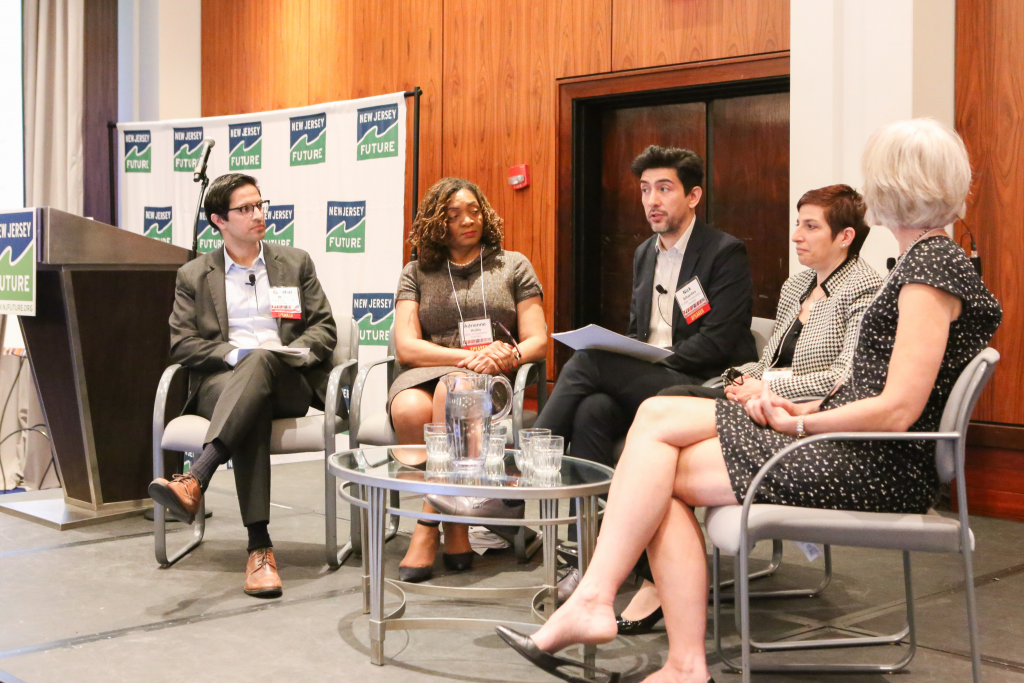
New Jersey Future’s Redevelopment Forum 2020 included a thought-provoking morning plenary titled Building Healthy Communities that focused on creating healthier, more equitable communities utilizing a culture of health approach in planning and redevelopment. The plenary’s panel of experts included moderator Giridhar Mallya, Senior Policy Officer for the Robert Wood Johnson Foundation, Staci Berger, President and CEO of the Housing and Community Development Network of New Jersey, Adrienne Hollis, PHD, JD, Senior Climate Justice and Health Scientist for the Union of Concerned Scientists, Nick Sifuentes, Executive Director of the Tri-State Transportation Campaign, and Chris Sturm, Managing Director of Policy and Water at New Jersey Future. The panelists collectively discussed ways in which the built environment seriously impacts the health of the people within it, with specific focus on climate change, equity, transportation, housing, and lead.
Climate Change
Adrienne Hollis opened the plenary with a riveting presentation on climate change and its inequitable impacts on the health of communities. Comparing climate change to an epidemic requiring a global response much like the current COVID-19 pandemic, Hollis noted that the effects of climate change and related adverse health effects are experienced “first and worst” in environmental justice communities. Hollis explained that race is the most significant predictor of a person living near contaminated air, water, and soil, and that climate change compounds the existing health problems of environmental racism. Hollis also spoke about present-day concerns of climate gentrification as a result of climate change and the “food apartheid” occuring as some families are forced to choose between eating and keeping their children cool. Urging everyone to act now, Hollis said “climate change is a public health emergency. There is no doubt… We have to be responsive to it. And by being responsive, I don’t mean just adaptation and mitigation, I mean making sure our communities can go from surviving to thriving and being resilient.”
Equity
Giridhar Mallya continued the discussion on the link between health and equity with an informative overview of the recent report Building a Culture of Health: A Policy Roadmap to Help All New Jerseyans Live Their Healthiest Lives by the Robert Wood Johnson Foundation and Rutgers University. Mallya defined health equity as everyone having a fair and just opportunity to be as healthy as possible, noting “this requires removing obstacles to heath such as poverty, discrimination, and their consequences, including powerlessness and lack of access to good jobs with fair pay, quality education and housing, safe environments, and health care.” Following the presentations by Hollis and Mallya, the panel participated in a moderated discussion on the most pressing health issues related to planning and redevelopment, again with a focus on equity.
Transportation
Nick Sifuentes emphasized the inextricable link between transportation, poverty, and health, and therefore the critical need for transportation planning to take equity into consideration. In poor communities that lack access to good reliable transportation, Sifuentes described how “your entire world shrinks” as access is lost to jobs, health care, and education that could uplift someone out of poverty. Sifuentes said there is opportunity for real change in transportation planning and revitalization as new policies are developed to address the current transportation system crisis and the fact that the transportation sector is a key driver of climate change.
Housing
Staci Berger stressed the need for affordable housing development with access to transit, and described how Superstorm Sandy demonstrated the strong connection between climate change, the built environment, and health. Berger described how, following Sandy, displaced homeowners experienced a wide range of health problems in large part due to New Jersey’s lack of affordable housing. Berger also spoke about the connection between home ownership, rental opportunities, health equity, and race. Berger explained that in New Jersey’s expensive rental market, a person would have to work three full-time jobs to afford an apartment. With so many families working just to pay rent, paying for medical care often is not an option. Berger noted that when someone is evicted in the state, it is very difficult to find another safe affordable rental and that “eviction rates in New Jersey are a public health crisis” as so many sick workers must go to work to avoid eviction.
Lead in Drinking Water
New Jersey Future’s Chris Sturm highlighted removing lead from New Jersey drinking water as the most pressing and urgent water infrastructure issue, given that lead exposure causes permanent damage to children’s developing brains and is present in private homes. Sturm detailed the inequities of the lead problem, noting that “the people it impacts have the least power to affect change” and that children born into low-income families and children of color are much more likely to experience lead poisoning. Sturm also discussed the groundbreaking plan to remove lead in New Jersey drinking water within the next ten years. The plan stems from the work of the Jersey Water Works Lead in Drinking Water Task Force and its consensus report released last October, which recommended solutions New Jersey is now starting to implement.
 Given the many present-day health concerns impacting the built environment of our communities, New Jersey Future is dedicated to incorporating a culture of health into all of our work. From removing lead service lines, to making our coastal communities more resilient, to helping towns plan for healthy walkable downtowns, we are helping New Jersey grow smarter and healthier. We hope you will join us.
Given the many present-day health concerns impacting the built environment of our communities, New Jersey Future is dedicated to incorporating a culture of health into all of our work. From removing lead service lines, to making our coastal communities more resilient, to helping towns plan for healthy walkable downtowns, we are helping New Jersey grow smarter and healthier. We hope you will join us.
This summary was written by Kelley Heck from Heck Public Affairs.